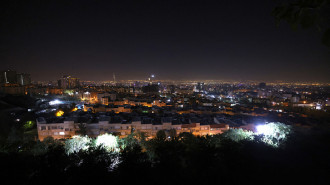Thousands rally for fifth week against Israeli govt reform plan
Thousands of Israelis demonstrated in central Tel Aviv Saturday for the fifth consecutive week against controversial legal reforms touted by Prime Minister Benjamin Netanyahu's right-wing government.
Crowds carrying blue and white Israeli flags braved the rain, swarming the city's central Kaplan Street, with signs labelling the new government a "threat to world peace".
Another sign read "Save Israel's democracy from Netanyahu".
The protests have become a weekly fixture on Saturday evenings since Netanyahu's new government -- dubbed the most right wing in Israel's history -- took office in late December.
Local media reported that protests were held in 20 cities across the country, and said tens of thousands gathered in Tel Aviv alone.
Israeli police did not provide official figures for turnout when contacted by AFP.
Dania Shwartz, 44, from Ramat Gan told AFP that protesters were "reclaiming" the Israeli flag.
"If you look around there's a lot of Israeli flags and for many years the Israeli flag was a symbol of the right (wing)," she said.
"We are patriots and we want this country to keep existing. The Israeli flags belongs to all of us, this is not a question of being right or left."
Shwartz also expressed concern that, as a member of the LGBTQ community, "this new government will try to pass laws that will affect my children.
"For example the Noam party wants to delegitimise families like ours and it's very scary," she said, referring to one of Netanyahu's coalition partners known for its virulently anti-gay stance.
Among the crowd in Haifa was former Israeli prime minister Yair Lapid, who said in a video posted to social media: "We will save our country because we are unwilling to live in an undemocratic country."
Netanyahu returned to power following elections in November, at the head of a coalition with extreme-right and ultra-Orthodox Jewish parties.
Last month, he was forced to remove a top minister, Aryeh Deri who leads the ultra-Orthodox Shas party, due to a recent tax evasion conviction.
The government has since announced its intention to pursue a policy of settlement expansion in the occupied West Bank, as well as social reforms that have worried the LGBTQ community and controversial judicial reforms.
The judicial reforms would allow Israel's parliament to overrule any Supreme Court decision with a simple majority of 61 lawmakers in the 120-seat body.
The proposed reforms would also change the system through which judges are appointed, giving politicians more control.
In 2019, Netanyahu refused to step down when he became the first sitting Israeli prime minister to be indicted while in office.
He was ousted following elections in 2021 by a motley coalition headed by Yair Lapid and Naftali Bennett.

![Palestinians mourned the victims of an Israeli strike on Deir al-Balah [Getty]](/sites/default/files/styles/image_684x385/public/2024-11/GettyImages-2182362043.jpg?h=199d8c1f&itok=xSHZFbmc)


![The law could be enforced against teachers without prior notice [Getty]](/sites/default/files/styles/image_684x385/public/2178740715.jpeg?h=a5f2f23a&itok=hnqrCS4x)
 Follow the Middle East's top stories in English at The New Arab on Google News
Follow the Middle East's top stories in English at The New Arab on Google News
![Thousands of people have fled from Lebanon to Syria as a result of Israel's war [Getty]](/sites/default/files/styles/image_330x185/public/2024-11/GettyImages-2180619380.jpg?h=199d8c1f&itok=q4PK1BtW)

![Anwar Ibrahim (centre) said that Malaysia would support the Palestinian people against Israel's genocide [Getty]](/sites/default/files/styles/image_330x185/public/2024-11/GettyImages-1742690206.jpg?h=69f2b9d0&itok=ZYgNyRPM)